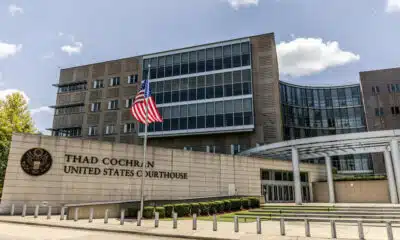Mississippi News
Judges appear ready to end oversight of mental health system
Federal judges appear ready to end court oversight of Mississippi mental health services
NEW ORLEANS – A panel of federal judges appears willing to overturn the court-ordered remedial plan and monitor overseeing Mississippi’s mental health system, their questions during oral arguments on Wednesday suggested.
The judges also asked the parties in the state’s mental health lawsuit to explain whether the Department of Justice can sue states directly for violations of the Americans with Disabilities Act (ADA) — an issue neither side raised in their own briefs to the court. That signaled the judges’ potential interest in issuing a more sweeping ruling that could curtail enforcement of disability rights law around the country.
Scott Stewart, Mississippi’s solicitor general, argued before the U.S. Court of Appeals for the Fifth Circuit that the state had already met the “objective criteria” of expanding community-based mental health services. He said the Justice Department had overreached not only in the Mississippi case but in similar lawsuits around the country.
Anna Marks Baldwin, representing the Department of Justice, said it was not yet clear that Mississippi had made community services accessible to people with serious mental illness.
The oral arguments marked the latest turn in a case that has dragged on since 2011. That year, the Justice Department told the state it was violating the ADA by unnecessarily hospitalizing people with serious mental illness. In 2016, the Justice Department sued. U.S. District Judge Carlton Reeves found Mississippi was violating the ADA, approved a remedial order to expand community-based services, and appointed a special monitor to oversee compliance. Mississippi appealed his ruling to the Fifth Circuit last year.
According to evidence the Justice Department presented at trial, Mississippi had for years before the lawsuit provided community-based services “on paper,” but utilization rates were extremely low and the services were unavailable in many counties. In appointing the monitor, Reeves said it was important to verify the state’s claims.
Judge Edith Jones questioned the appointment of a special monitor, who has been compiling twice-yearly reports evaluating Mississippi’s community-based services, after the state said it had already made necessary changes.
“How did the court have authority to issue an ongoing injunction?” she asked Baldwin.
Baldwin responded that the injunction ensured compliance over time.
“But that’s not the way courts work,” Jones said. “You don’t say, ‘Oh yeah, I thought of eight or nine things you need to do, and oh, by the way, you need to pay for the monitor forever,’ with no limit whatsoever on what he says.”
Stewart told the panel that the Department of Justice lacked authority to sue Mississippi at all under Title II of the Americans with Disabilities Act, which requires state and local governments to provide equal services to people with disabilities. Though the statute does not expressly state that the attorney general can bring suit against local governments, the Department has pursued legal action under the statute since it came into effect in 1992. Instead, Stewart said, a suit would need to be brought on behalf of specific individuals who had allegedly experienced discrimination.
Baldwin responded that Congress clearly intended the Justice Department to be able to sue to enforce the provisions of Title II.
The question of the Justice Department’s authority to sue states directly was not raised by either party in their briefs to the court. Instead, the judges sent a request to parties asking them to answer it, signaling their potential interest in a more sweeping ruling.
Judge James C. Ho pointed out that if the panel sided with Stewart, that would create a split with the Eleventh Circuit, which rejected the same argument made by the state of Florida.
“You would create a circuit split, but I do think this is one of those cases where that is warranted,” Stewart responded. “I really do think it is that important.”
Florida appealed to the Supreme Court, which recently declined to hear the case. But a circuit split would increase the likelihood that the nation’s highest court would take up the issue.
A finding that the Justice Department cannot sue states under Title II would have major implications for the enforcement of disability law in the U.S., since federal lawsuits or the threat of federal legal action have driven state and local governments to make changes like installing ramps at courthouses and wheelchair lifts on public buses.
Department of Mental Health Director Wendy Bailey attended the arguments in New Orleans.
The panel – comprised of Jones, Ho, and Judge Leslie Southwick, all Republican appointees – sits on what is regarded as the nation’s most conservative appeals court.
During the Obama administration, the Department of Justice was involved in 50 cases similar to the suit against Mississippi, aiming to force states to ensure people with disabilities were able to live in their communities, rather than be institutionalized. These are known as Olmstead cases, after the Supreme Court decision that found unnecessary institutionalization to be a form of discrimination against people with disabilities.
Baldwin presented some of the evidence the Justice Department brought to trial in 2019. A clinical review of a representative sample of people who had been hospitalized in Mississippi found that of 154 people interviewed, all of them could have avoided or spent less time in a state hospital “if they had been provided reasonable community-based services,” according to the Justice Department’s brief.
Stewart pointed out that most of the people in the sample were not hospitalized at the time of their interview. He argued that the Justice Department’s claim that people with mental illness were “at risk” of unnecessary hospitalization in Mississippi lacked objectivity.
“If someone is in the community now, the regulation is satisfied,” he said of Olmstead’s integration mandate.
“People with serious mental illness are, unfortunately, they’re virtually, by definition, always at risk of institutionalization,” he continued. “That’s the nature of this very, very challenging illness.”
Sitting in the audience, Joy Hogge, executive director of the nonprofit Families As Allies, which advocates for kids with behavioral health challenges, was disturbed by that claim.
“That was really scary to me, that he would think that about his fellow citizens who might have a mental illness,” she said. “We’re all people first. The fact that he’s just making that assumption, it’s like he’s writing off a whole group of people… ‘Oh well, they can end up in the state hospital anyway.’”
Baldwin said that because Mississippians with mental illness have often cycled in and out of state psychiatric hospitals, it’s not speculative to recognize that people who have recently been hospitalized could wind up there again.
“That they remain at-risk of future institutionalization is not a speculative future harm,” she said. “It’s just because the United States isn’t suing in a representative capacity for these exact individuals, it’s saying, the harm has occurred … and it will continue to occur, absent the state [expanding community services].”
Jones also sounded skeptical of the Justice Department’s track record of suing states.
“I know the DOJ has sued Florida and Georgia,” she said to Baldwin. “Probably sued Alabama because it’s right next door to Mississippi. When are you going to sue Texas?”
Baldwin responded that the Justice Department’s authority to sue under Title II was “well-established.”
The Fifth Circuit website says the court aims to issue opinions within 60 days of oral arguments.
This article first appeared on Mississippi Today and is republished here under a Creative Commons license.
Mississippi News
Events happening this weekend in Mississippi: July 18-20
SUMMARY: Mississippi offers a variety of events this weekend (July 18–20), including family activities, art exhibitions, markets, and festivals. In Jackson, highlights include the Mississippi Wildlife Extravaganza, multiple exhibits at local museums, Neon Night at the Children’s Museum, and the JXN Film Festival. Farmers markets run in Jackson, Vicksburg, and Natchez. Ridgeland hosts Christmas in July and pottery classes. Clinton features train-themed crafts and a film screening. In the Pine Belt, Hattiesburg presents Clue: The Musical, zoo game nights, and exhibits. Laurel offers karaoke, art, and teen movie nights. Ellisville holds Market Days with crafts, food, and kids’ activities.
The post Events happening this weekend in Mississippi: July 18-20 appeared first on www.wjtv.com
Mississippi News
Events happening this weekend in Mississippi: July 11-13
SUMMARY: From July 11-13, Mississippi offers a variety of events for all ages. In Jackson, enjoy the season finale of “Late Night with Rita Brent,” Disney’s The Lion King, Jr., and exhibitions at the Mississippi Children’s Museum. Pearl hosts the Mississippi Mud Monsters with fireworks and a Back 2 School Bash. Ridgeland features the Wildflower Field, Art Park, Renaissance Christmas in July sales, and a Fairy Garden Workshop. Natchez and Vicksburg offer farmers markets and local entertainment. Hattiesburg presents Po Boy Fest, Clue: The Musical, and outdoor movies. Activities include rodeos, ice cream tastings, run clubs, and community tennis events across the state.
The post Events happening this weekend in Mississippi: July 11-13 appeared first on www.wjtv.com
Mississippi News
Death toll from catastrophic Texas flooding passes 100
SUMMARY: Catastrophic flooding in Texas over the July Fourth weekend killed at least 104 people, including 28 children, mostly near Camp Mystic, a century-old girls’ summer camp in Kerr County. Search-and-rescue teams continue to search swollen rivers for dozens still missing; officials expect the death toll to rise as more rain threatens the saturated area. Many victims were swept from cabins by flash floods early Friday, some clinging to trees. Authorities will investigate warnings and evacuation delays, noting poor cellphone service hindered alerts. Despite warnings issued before the flood, some residents didn’t receive them. President Trump plans to visit the state.
The post Death toll from catastrophic Texas flooding passes 100 appeared first on www.wjtv.com
-
News from the South - Tennessee News Feed5 days ago
Bread sold at Walmart, Kroger stores in TN, KY recalled over undeclared tree nut
-
News from the South - Arkansas News Feed7 days ago
Man shot and killed in Benton County, near Rogers
-
News from the South - Georgia News Feed1 day ago
Aiken County family fleeing to Mexico due to Trump immigration policies
-
News from the South - Alabama News Feed6 days ago
Girls Hold Lemonade Stand for St. Jude Hospital | July 12, 2025 | News 19 at 10 p.m. – Weekend
-
News from the South - Georgia News Feed7 days ago
Anti-ICE demonstrators march to Beaufort County Sheriff's Office
-
News from the South - Oklahoma News Feed7 days ago
Police say couple had 50+ animals living in home
-
Mississippi Today4 days ago
Coast judge upholds secrecy in politically charged case. Media appeals ruling.
-
Local News5 days ago
Oyster spawning begins as MDMR-USM Hatchery Program enters production phase using mobile hatchery














































